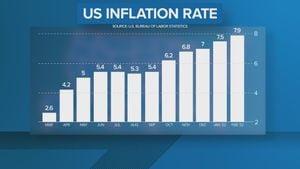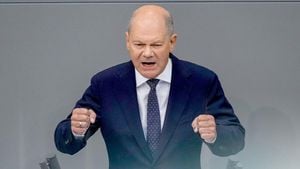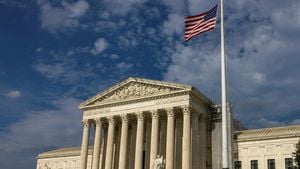With Donald Trump gearing up for another term as President, the Middle East is buzzing with speculation over how his return could reshape the region's geopolitical dynamics. Recent gatherings of Arab and Islamic leaders have revealed varied perspectives on the anticipated shifts, with optimism and uncertainty coexisting. The reactions to Trump's potential re-entry to power reflect the complex interplay of hope and apprehension among regional players.
At a recent summit held in Saudi Arabia, leaders discussed the unpredictable nature of U.S. politics. While European nations often express concern over Trump's erratic behavior, Gulf Arab states perceive him as bringing stability, especially concerning security alliances. Khalaf al-Habtoor, a prominent leader from the UAE, articulated this sentiment, stating, "in a Middle East where security is imperative, Trump’s emphasis on strong alliances against extremism offers kind of hope for the future." This view contrasts sharply with the sentiment toward Joe Biden, who is seen less favorably by key players like Saudi Arabia and the UAE.
Trump's initial foreign trip as president to Riyadh laid the groundwork for solidified relations with Gulf monarchies, particularly through his son-in-law Jared Kushner’s strong ties with Crown Prince Mohammed bin Salman (MBS). The dynamic of this relationship could prove pivotal as MBS has harbored resentment toward the Biden administration following Biden's remarks deeming Saudi Arabia "a pariah" for its human rights record.
During his first term, Trump’s approach to the Middle East was contentious. On one side, he angered many Arab nations by declaring Jerusalem as Israel's capital and supporting Israel's annexation of Golan Heights. Yet, his presidency also bore fruit with the Abraham Accords—facilitated diplomatic relations between Israel, the UAE, Bahrain, and Morocco. These accords represented a significant shift toward normalization between Israel and several Arab states.
The tenor of U.S.-Israel relations under Trump was marked by staunch support, with former Israeli intelligence officials highlighting how Trump's assertive stance against Iran solidified his place as Israel's ally. For the Gulf states, Trump’s aggressive policies against Tehran have resulted in increased military consolidation and the perception of enhanced security against perceived Iranian ambitions.
Fast forward to today; the Middle East’s situation has shifted considerably. With Israel engaged militarily with both Hamas and Hezbollah, the regional power dynamics are more fragile. The Biden administration's perceived waning influence amid international relations has caused disquiet, especially as U.S. efforts to mediate the violence have appeared less effective. Trump’s return could offer Israel more leeway to engage militarily with Iranian targets, potentially reigniting tensions already fraught with instability.
Complicatively, recent diplomatic overtures between Saudi Arabia and Iran—brokered by China—illustrate the changing calculus of Middle Eastern politics. The recent thawing of relations could lead to enhanced cooperation on various fronts, including defense, as both nations seem inclined to mend fences after years of animosity, largely characterized by the protracted Yemen conflict.
The situation on the ground remains tenuous. The Arab League has made calls to end hostilities between Israel and Palestinian factions, but the responses from various leaders reflect diverse priorities and potential divisions. The optimism following discussions among leaders is tempered by uncertainties surrounding what Trump’s potential actions might entail.
Fueling the speculation is how regional leaders may navigate their responses to new policies under Trump's administration. For Israel, Netanyahu's administration celebrates the potential of closer ties with the U.S. under Trump, particularly as Israeli officials maneuver to secure favorable policies, including potential military support.
Palestinian factions, conversely, express trepidation about the future, fearing Trump's alignment with Israel's far-right sentiments could intensify crises within occupied territories. The concerns revolve around what they view as potential ethnic cleansing, particularly with Trump's prior policies realigning American support firmly behind Israeli actions.
Tehran, for its part, is considering how to engage with the U.S. moving forward. Trump's hardline stance against Iran during his first presidency was characterized by aggressive sanctions and military actions, including the targeted killing of Iranian General Qasem Soleimani, actions which have left lasting impacts on Iran’s approach toward U.S. relations. Iranian officials are now weighing their options, contemplating whether to resume negotiations contingent on changes brought by Trump’s administration.
Gulf allies of the U.S. also grapple with the reality of Trump's unpredictable foreign policy. While seeking stability, leaders from Saudi Arabia, the UAE, and Oman remain cautious, recognizing the potential volatility of aligning too closely with U.S. interests. The shifting tides of diplomacy and regional conflicts could challenge established alliances as leaders balance the need for security with the unpredictability of U.S. policies.
Turkey’s President Erdogan, meanwhile, appears eager to extend the olive branch, hoping to capitalize on renewed dialogue with Trump. Despite his past criticisms of the former president, Erdogan's desire for enhanced cooperation reflects the broader regional strategy of solidifying ties amid the changing power dynamics.
Turning to Pakistan and Afghanistan, both nations are taking note of Trump's victory, hopeful about his policies supporting economic reassurances and potential developmental aid. Observers from these countries express optimism around Trump’s return, viewing it as a possible pivot for addressing long-standing issues. Early interactions are expected to involve economic discussions, focusing on rebuilding relations after years of strained ties.
With the Middle East's future still uncertain, the interplay among geopolitical forces continues to pivot. How Trump’s re-election will translate to actionable foreign policy remains to be seen. For now, the juxtaposition of optimism and caution creates numerous queries concerning the Middle East's path forward. Leaders are positioned between the aspirations for stabilization and the realities of complex international relations, facing the potential ripple effects of Trump's policies.
So as summits convene and nations talk, one thing remains clear—there's no shortage of tension, but perhaps also, the chance for new beginnings stemming from the looming changes on the horizon as Trump prepares to take the reigns of power once again.



